On Home Turf
Air Date: Week of September 5, 2008
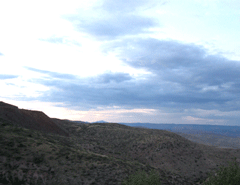
Near Jerome, Arizona. (Photo: Ingrid Lobet)
Much has been reported over the years on Senator John McCain's record on national energy issues, but what about his record in Arizona, the state he's represented for two and a half decades? Living On Earth's Ingrid Lobet went to Arizona to look at McCain's record in his dry, mineral-rich state, where most of the land is either public or Indian-owned.
Transcript
During this campaign we’ve looked at John McCain's record as a national legislator in some degree of detail. But as part of Arizona’s delegation to Congress since 1982, what’s his record in terms of advancing energy and environmental protection on behalf of his state, with its vast public lands and national parks, including the Grand Canyon? Living On Earth's Ingrid Lobet looks at the causes the would-be president took on at home … in a state with 25 percent Indian land, a fast growing population and growing concerns over water.
[WALKING ON DESERT SOIL AND QUIET BIRDS]
BEATTIE: That’s the creosote bush and when it rains it's like the best desert smell on the entire planet.
LOBET: Tina Beattie picks her way over rocky ground in the dramatic Superstition Mountains, east of Phoenix. She grew up right near here. Now she's Arizona coordinator for Republicans for Environmental Protection.
BEATTIE: The great thing about the Superstition Mountains is they're just incredibly majestic: just huge, massive rock structure. Out here you know you have the saguaros and ocotillos and creosote and Palo Verde. So it's all the beautiful plants of Arizona, juxtaposed with kind of this rugged rockiness.
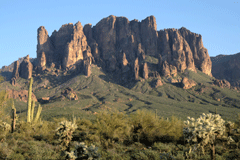
The Superstition Mountains near Phoenix, Arizona. (Photo: Jake Haskell)
BEATTIE: You know as a kid you're not thinking ‘Boy, I hope some very forward thinking politician is protecting all this for my kids.' But as an adult, that level of protection for this area -- I bring my 10-year-old stepson out here, and expose him to what he doesn't get just 20 miles away where we live.
LOBET: Not long after this wilderness was expanded, McCain helped Udall pass another major bill, the Arizona Desert Wilderness Act of 1990, protecting another 2.4 million acres. No fewer than 78 areas of wilderness were created under these two laws.
McCain says when he went to Congress from the military, he was on the far right. But Democrat Morris Udall, who chaired the then House Interior Committee, reached out to him, inviting him to press conferences, treating him publicly with respect. In this oral history recorded for the University of Arizona, McCain says that taught him allies could be found in either party.
MCCAIN: He and I flew over, walked over, drove over huge amounts of the state of Arizona when we were doing these wilderness bills and had tens of hearings that were long ones, so we could hear from everybody. That certainly had an impact on me.
LOBET: Those years also saw controversy over aircraft noise in the Grand Canyon. Rob Smith of the Sierra Club credits McCain with the law that returned a measure of peace to the iconic park.
SMITH: There are almost a hundred thousand aircraft flights of just tourist airplanes that rain noise down on the Grand Canyon, and it used to be they would fly everywhere including all the way down to the river level a mile below the rim.
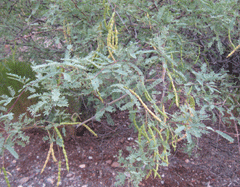
Velvet Mesquite, Clarkdale, AZ. (Photo: Ingrid Lobet)
LOBET: In his Phoenix office, Smith points to a wall map of Arizona that shows more than half the state is public land. The Sierra Club worked with McCain on land issues earlier in his career. But when Smith looks at the Senator's whole record, what he sees is mixed:
SMITH: It's always worth asking and always worth talking to him about environmental issues, but you're never sure which one he's going to pick up on. If it's about the Grand Canyon, he's generally been pretty good. If it's about national park protection in other places, his vote you couldn't count on. When no one was doing anything, he was proposing higher miles per gallon for cars, which would save fuel. But when the key votes came in this last Congress, last year, he couldn't be found.
LOBET: The origin of the word Arizona is uncertain but it's hard to ignore its similarity to the Spanish words for a dry, arid place, una zona árida.
Arizona is the second fastest growing state in the nation. Americans and new immigrants are rushing to a sun-seared part of the country where water is scarce. Builders keep creating dreams in the desert and each new household sticks its straw in the ground. It puts a lot of pressure on streams, and on underground water.
[QUAIL AND INSECTS]
ADAMS: Coming up here I really didn't know what I was getting into. I’d been in the city for a long time so I’d kind of lost touch with being from the country.
LOBET: A rabbit sprints from mesquite to mesquite. Quail are hiding. Dr. Richard Adams stands at the pipe that marks his well, the source of water for a family of four that left Phoenix and moved to the country.
ADAMS: So the idea that we would run out of water just really never crossed my mind.
LOBET: But that's what happened. Adams was home from work. He was watering a plant, when the hose pressure weakened… then was gone. This beautiful adobe custom home …and no water.
ADAMS: It's kind of I think an epiphany…. Kind of like when I heard that my mom was ill, actually I saw her, she came up and I was in residency and I put a chest x-ray up and I saw her, and I just went, 'Whoa, this is real.' That was the kind of feeling.
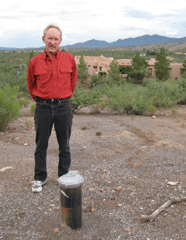
Dr. Richard Adams beside the well he had to deepen. (Photo: Ingrid Lobet)
ADAMS: When I was down there, everybody had a pool. I certainly spent more time cleaning it than swimming in it. Anyway I just took water for granted. And I don't do that anymore.
LOBET: And will this experience rise to the level of voting issue in November?
ADAMS: Yeah, environmental issues are going to play into how I vote. Absolutely.
LOBET: The McCains own a home just over the hill from here in Cornville, AZ. So Dr. Adams assumes that the Senator understands the fragility of water. But he doesn't say if McCain will get his vote.
John McCain hasn't focused much on Arizona water issues. But Tina Beattie says she doesn't fault him for that. She says it's a concern that would have to rise up from Arizonans themselves. So far it hasn't.
BEATTIE: We're probably the only western state that hasn't seen water restrictions, which is a little nutty. I've never not been able to water my lawn or anything like that. Our water is cheap so we don’t really have a financial incentive to conserve.
LOBET: But the Sierra Club's Rob Smith says it IS incumbent on leaders to recognize that water use in the state is unsustainable and to conserve it for people and wildlife, even if the issue isn't front and center for voters. And though many water decisions are made at the local level, Smith believes the senator could have done more.
SMITH: McCain has expressed some concern and interest in maintaining streams, but really hasn't proposed strong measures to really preserve those stream flows the way we think they need to be.
For instance, the designation Wild and Scenic River could maintain stream flows along a stretch of river. That has been proposed for the Upper Verde River but that bill has not been introduced. That is something a senator could have done.
LOBET: Senator McCain has been outspoken on energy policy, leading on climate change earlier this decade. His approach emphasizes nuclear power.
This being mining country, silver, gold and copper interests have wielded enormous political influence in Arizona for decades. The Grand Canyon itself lies surrounded by rocks rich in uranium, the raw material for firing nuclear power plants. Rob Smith and others point out, that's a subject McCain has not been eager to discuss.
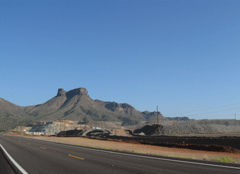
The Asarco-operated Ray open pit copper mine in Hayden, AZ. (Photo: Ingrid Lobet)
LOBET: That issue has been of particular interest to Arizona Democratic Congressman Raul Grijalva, who occupies Mo Udall's old seat. He hoped he might be able to work together with McCain to keep uranium mining away from the Grand Canyon.
GRIJALVA: You know in four years we went from having 11 permits to mine in the Grand Canyon, to over a thousand – they’re just expedited, given to people immediately.
The difference here is that it is the Grand Canyon, and we felt that this, the icon of our national parks, a world icon, seven natural wonders of the world, is eminently threatened by this uranium mining. And so we’re not saying that you can't mine for uranium in some other piece of public land. We are saying this is sacred for a lot of reasons and we want to protect it.
LOBET: But McCain hasn't addressed the new uranium claims near the national park. Congressman Grijalva says he also wanted to work with McCain on the extensive pollution left behind by old gold, copper and uranium mines in the West, and to make sure the same thing doesn't happen with the new mining boom now underway. Those reform efforts were thwarted by a Democrat, not a Republican--that was Senator Harry Reid of Nevada--but Grijalva says Senator McCain should be more forthcoming about where he stands on western mining.
GRIJALVA: You know, running for the highest position in this nation and the world, his attitude about the protection of the Grand Canyon, his attitude about how we balance public lands resource protection with resource extraction, I think those are valid issue that he needs to talk about.
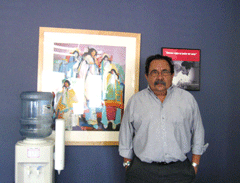
Congressman Raúl Grijalva (D) of Arizona's 7th District. (Photo: Ingrid Lobet)
[WATER FEATURE AND FAINT MUSIC]
LOBET: Visitors enjoy the lobby in the five-star Wild Horse Pass Resort on the Gila River Indian Reservation. Attorney Steve Heeley is Pottawatomi and has long represented the tribes here. He also worked with John McCain for years in Congress. He says in the 1980s, the Environmental Protection Agency still hadn't worked out its relationship with tribes, and that meant problems on tribal lands.
HEELEY: So you had these holes, and if we take Arizona as an example, 25 percent of the state of Arizona was under the control of Indian tribes and those 25 percent of the lands weren’t receiving the level of protections they were entitled to.
LOBET: As chair of the Senate Indian Affairs Committee, John McCain helped tribes get the power and funding to set their own environmental standards, Heeley says. McCain was also committed to helping tribes develop businesses on reservations in the days before widespread Indian gaming.
HEELEY: Senator McCain was very interested in addressing issues regarding economic development in Indian country. There was lot of poverty, overwhelming infrastructure needs, so senator McCain focused on trying to provide incentives for businesses to locate on reservations, and to hire Natives to work in those facilities.
LOBET: And Steve Heeley says the work was always a collaboration of Democrats and Republicans on the Committee.
HEELEY: That was something that was made very clear to those of us on the staff, that there was no partisanship, and it wasn't even bi-partisanship, we worked together on a non-partisan basis.
LOBET: Not everyone feels McCain has delivered on Native issues. Anthropologist Thayer Scudder at the California Institute of Technology worked for the Navajos on a complicated issue involving the Hopis, grazing and coal mining. Thousands of Navajos were forced to leave their homes.
SCUDDER: McCain was very much aware of the fact that it caused a lot of hardship, but there was no major effort in the legislation, either at the time or subsequently, to correct the poverty that had been caused by the relocation.
[RANCHERA MUSIC]
LOBET: Arizona, like the rest of the country, is becoming more Latino. Of course many Hispanic families have been here since the 18th century.
But others are just arriving, and in Arizona they face some of the fiercest anti-immigrant sentiment in the country.
RADIO VOICE BERMUDEZ: Estamos diciendole que tengan mucha cautela en la 19 avenida y Greenway...
LOBET: Here morning drive host and immigrant advocate Elias Bermudez advises listeners to avoid a certain intersection where a raid is just now taking place.
RADIO VOICE BERMUDEZ: ...se esta juntando por ahi, oficiales del Sheriff con sus patrullas. Parece que probablemente tengan algun operativo...
LOBET: John McCain has not been part of the many anti-immigrant proposals in Arizona -- in fact, quite the opposite, says Bermudez.
BERMUDEZ: He has been for us and he has fought very hard in the Senate. He has joined hands with Ted Kennedy. He was criticized heavily by his party for doing so.

Near Jerome, Arizona. (Photo: Ingrid Lobet)
BERMUDEZ: And even at the risk of losing his nomination he was the person who said, yeah, we must deal with the border problems, we must secure our borders, but we also need to deal with the 12 million people who are here and are children of God.
LOBET: McCain has since pulled back from his own bill, disappointing some supporters. But Bermudez will vote for him. The majority of Latinos here, as elsewhere, are expected to vote for Barack Obama, in part because nearly all the anti-immigrant proposals have come from Republicans. But Bermudez says don't think Latinos vote on a single issue.
BERMUDEZ: We are very much interested in saving this planet. I come from a very small town in Mexico where we still depend on the rain to plant our crops, and it's getting harder and harder to plant those crops because the rains are late, or when they do come, they come in a devastating flood instead of the way that we need them. So we do have all the other issues the same as every other American.
LOBET: Bermudez and other McCain supporters like Tina Beattie or Republicans for Environmental Protection say they respect McCain for addressing the environmental issues he supports, and for doing so despite sometimes paying a price within his party.
BEMUDEZ: I think Senator McCain is where he is, because there are a lot of Republicans in this nation who feel compelled by these issues: they hunt, they hike, they have children, they want clean air and they want clean water. It's not foreign to them as Republicans and I think McCain's popularity and where he is today speaks to the fact that he's in tune with more constituents than he gets credit for.
LOBET: For Living On Earth, I’m Ingrid Lobet in Arizona.
[MUSIC: Garage A Trois “Amanjo” from Outre Mer (Spire Artists media 2005)]
CURWOOD: We’d like to hear from you. Tell us how you see the candidates stacking up, when it comes to issues of sustainability and environmental protection. You can email us at comments@loe.org. Once again, comments @ l-o-e dot O-R-G. And you can call our listener line anytime, at 800-218-9988. That's 800-218-99-88.
And if you have a story idea about the elections, please click on “story ideas” on our website, www.loe.org, where you can also hear our program anytime or get a download for your audio player. That’s www.loe.org.
Just ahead, the GOP and its energy platform. You’re listening to Living on Earth.
ANNOUNCER: Support for the Environmental Health Desk at Living on Earth comes from the Cedar Tree Foundation. Support also comes from the Richard and Rhoda Goldman fund for coverage of population and the environment. And from Gilman Ordway for coverage of conservation and environmental change. This is Living on Earth on PRI, Public Radio International.
Links
To learn more about water issues in Arizona, click here
Republicans for Environmental Protection
To learn more about aircraft over the Grand Canyon, click here
Living on Earth wants to hear from you!
Living on Earth
62 Calef Highway, Suite 212
Lee, NH 03861
Telephone: 617-287-4121
E-mail: comments@loe.org
Newsletter [Click here]
Donate to Living on Earth!
Living on Earth is an independent media program and relies entirely on contributions from listeners and institutions supporting public service. Please donate now to preserve an independent environmental voice.
NewsletterLiving on Earth offers a weekly delivery of the show's rundown to your mailbox. Sign up for our newsletter today!
 Sailors For The Sea: Be the change you want to sea.
Sailors For The Sea: Be the change you want to sea.
 The Grantham Foundation for the Protection of the Environment: Committed to protecting and improving the health of the global environment.
The Grantham Foundation for the Protection of the Environment: Committed to protecting and improving the health of the global environment.
 Contribute to Living on Earth and receive, as our gift to you, an archival print of one of Mark Seth Lender's extraordinary wildlife photographs. Follow the link to see Mark's current collection of photographs.
Contribute to Living on Earth and receive, as our gift to you, an archival print of one of Mark Seth Lender's extraordinary wildlife photographs. Follow the link to see Mark's current collection of photographs.
 Buy a signed copy of Mark Seth Lender's book Smeagull the Seagull & support Living on Earth
Buy a signed copy of Mark Seth Lender's book Smeagull the Seagull & support Living on Earth

